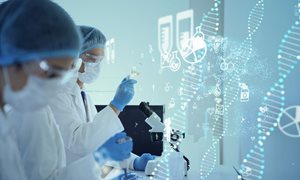
The coronavirus infects the kidneys and contributes to tissue scarring, as shown by researchers from the RWTH Uniklinik Aachen, Germany, and Radboud university medical center, the Netherlands. The developed scar tissue in the infected kidneys may suggest a possible impact on kidney outcomes in the long term.
The fact that the coronavirus can result in severe damage in the human body is known, and also that kidneys can get infected. But what exactly happens in the kidney as a result of the infection, remains elusive until now. In this study, published in Cell Stem Cell, researchers investigated the kidney tissue of COVID-19 patients admitted to the Intensive Care Unit. They found scarring of the tissue as compared to Intensive Care patients with a non-COVID-19 lung infection and a control group.
Next, the researchers questioned what exactly was the cause of the kidney damage. Could this be a direct effect of the virus, independent of systemic inflammation? To investigate this, the researchers cultured mini kidneys in the lab, called organoids. The kidney organoids are developed from stem cells and contain many different kidney cells, except immune cells. The kidney organoids were infected with SARS-CoV-2 and the researchers investigated the direct effect of the virus on the kidney cells, independent of potential secondary effects caused by immune cells or other systemic effects. The researchers found, in line with the COVID-19 patient tissues, scarring of the kidney organoids and accompanied signals that contribute to the scarring process.
The results of this study indicate that the recent finding of another USA based large cohort study that reported kidney functional decline in over 90,000 COVID-19 survivors (Bowe et al JASN), might be due to direct effects of the SARS-CoV2 virus on the kidney causing scar formation.
Researcher Jitske Jansen (Radboud university medical center): “In our study, we thoroughly investigated the causal damaging effects of the coronavirus in the kidneys. The infected kidney organoids show that the virus directly causes cell damage, independent of the immune system. With this work, we found a piece of the puzzle showing the deleterious effects the virus can have in the body”.
Researcher Katharina Reimer (RWTH Aachen Uniklinik): “Kidney fibrosis, or scarring, is a serious long-term consequence that can occur virtually after any injury to the kidney and correlates with kidney function. Our work shows kidney scarring in COVID-19 patients, which provides an explanation why the virus might cause kidney functional decline as demonstrated in other studies. Long-term follow-up studies will provide further insights into kidney-related pathologies caused by SARS-CoV-2“.

About the publication in Cell Stem Cell
SARS-CoV-2 infects the human kidney and drives fibrosis in kidney organoids – Jitske Jansen, Katharina Charlotte Reimer, James Shiniti Nagai, Finny S. Varghese, Gijs J. Overheul, […], Ronald P. van Rij, Ivan G Costa, Rebekka K. Schneider, Bart Smeets and Rafael Kramann.
DOI: https://doi.org/10.1016/j.stem.2021.12.010
-
Want to know more about these subjects? Click on the buttons below for more news.
More information
Annemarie Eek

wetenschapsvoorlichter
Pauline Dekhuijzen

wetenschaps- en persvoorlichter
Related news items

Grants for research on magnesium deficiency and malaria Vidis for Felix Hol and Jeroen de Baaij
1 July 2022 Radboudumc researchers Jeroen de Baaij and Felix Hol both receive an NWO Vidi grant for their research, respectively on magnesium deficiency in type 2 diabetes and on malaria. go to page
Human pluripotent stem cell-derived kidney organoids for personalized congenital and idiopathic nephrotic syndrome modeling
11 May 2022 Bart Smeets, Jitske Jansen and collegues, theme Renal disorders published this article in the Human Development. go to page
ERC Starting Grant awarded to Jeroen de Baaij
17 March 2022 Jeroen de Baaij, kidney researcher the Radboudumc, receives an ERC Starting Grant worth 1.5 million euros. He will use this grant to improve the diagnosis and treatment of severe magnesium deficiencies, which can lead to epileptic seizures and muscle cramps. go to page


